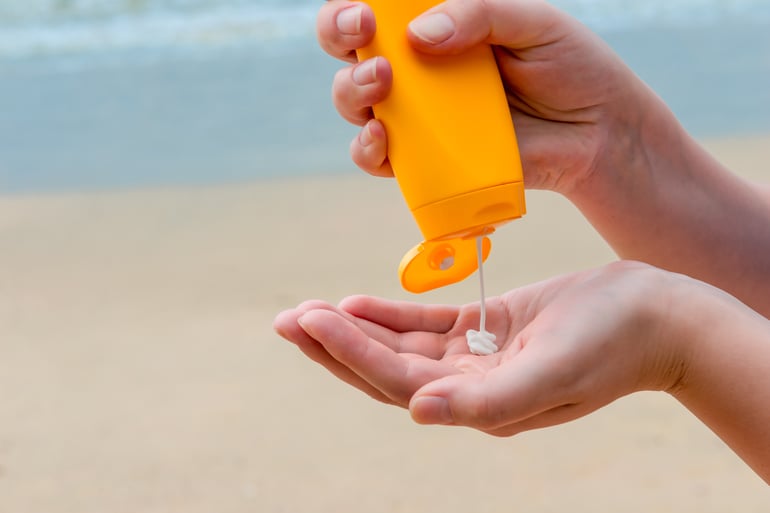
As temperatures soar across the country this summer, many Americans will use sunscreen to protect their skin from the dangers associated with excessive sun exposure, like skin cancer. However, few will pause to consider if their sunscreen could pose more of a serious health risk than unchecked sun exposure.
Our focus this month is on the Johnson & Johnson (“J&J”) Aerosol Sunscreen Litigations. Suits in this litigation all similarly center around allegations that certain sunscreen products manufactured, sold and marketed under J&J’s Aveeno and Neutrogena brands contain dangerous and unacceptable levels of known human carcinogen, benzene.
The Valisure Study:
The facts in the benzene litigations originated with a citizen petition submitted to the FDA on May 25, 2021 by online, FDA-regulated pharmacy Valisure. The petition requested that the FDA recall specific batches of certain sunscreen products containing benzene on the basis that they are adulterated under section 501 of the Federal Drug and Cosmetic Act (“FDCA”) and misbranded under section 502 of the FDCA. In the petition, Valisure described how benzene is a well-known human carcinogen and that on a domestic level, the Centers for Disease Control and Prevention (“CDC”) and the Department of Health and Human Services have both determined that benzene causes cancer in humans. Benzene has been specifically linked to leukemia, other blood and bone marrow disorders (including anemia) and weakening of the immune system, in addition to multiple myeloma and non-Hodgkin’s lymphoma. On an international level, Valisure explains that both the World Health Organization (“WHO”) and the International Agency for Research on Cancer (“IARC”) have classified benzene as a Group 1 compound, thereby defining it as “carcinogenic to humans.”
In the study, Valisure tested samples from 272 sunscreens and after-sun products, concluding that J&J’s Aveeno and Neutrogena products contained the highest amounts of benzene at rates well above the FDA conditional restriction of two parts per million (“ppm”). The FDA limit of 2ppm applies only if the use of benzene is unavoidable in order to produce a drug product with a significant therapeutic advance.
The Valisure study indicated that since several of the tested samples contained no traceable levels of benzene, the organization concluded that benzene is not unavoidable for the manufacturing of sunscreen and after-sun products. The report stated that the findings were especially troubling since the products involved are typically recommended for the prevention of skin cancer and are regularly used by both adults and children in large volumes. The report argues “because sunscreen products are typically used in many times high volume than standard drug products like tablets or capsules even a relatively low concentration limit can result in a very high total exposure.”
The affected products are:
- Neutrogena Beach Defense Oil-Free Body Sunscreen Spray – SPF 50;
- Neutrogena Beach Defense Oil-Free Body Sunscreen Spray – SPF 30;
- Neutrogena Beach Defense Oil-Free Body Sunscreen Spray – SPF 70;
- Neutrogena Beach Defense Oil-Free Body Sunscreen Spray – SPF 100;
- Neutrogena Beach Defense Water + Sun Protect – SPF 30;
- Neutrogena Beach Defense Water + Sun Protect – SPF 50;
- Neutrogena Beach Defense Water + Sun Protect – SPF 60;
- Neutrogena Beach Defense Water + Sun Protect – SPF 70;
- Neutrogena Cool Dry Sport Water-Resistant Sunscreen Spray – SPF 30;
- Neutrogena Cool Dry Sport Water-Resistant Sunscreen Spray – SPF 50;
- Neutrogena Cool Dry Sport Water-Resistant Sunscreen Spray – SPF 70;
- Neutrogena Cool Dry Sport Water-Resistant Sunscreen Spray – SPF 100;
- Neutrogena Invisible Daily Defense Sunscreen – SPF 50;
- Neutrogena Invisible Daily Defense Sunscreen – SPF 60;
- Neutrogena Ultra Sheer Sunscreen Spray – SPF 30;
- Neutrogena Ultra Sheer Sunscreen Spray – SPF 45;
- Neutrogena Ultra Sheer Sunscreen Spray – SPF 70;
- Neutrogena Ultra Sheer Sunscreen Spray – SPF 100;
- Neutrogena Sheer Zinc Dry-Touch Face Sunscreen Lotion – SPF 50;
- Aveeno Protect + Refresh Sunscreen – SPF 60; and
- Aveeno Baby Continuous Protection Sensitive Sunscreen Lotion, Broad Spectrum–SPF 50, collectively the “Products.”
The Allegations:
Plaintiffs in this litigation are all similarly alleging that despite the Products in question being found to contain high concentrations of benzene, nowhere on the packaging, labeling or advertising of the Products does it state that benzene is an ingredient. Complaints commonly argue that consumers trust J&J and its Neutrogena and Aveeno lines as products that are safe and free from harmful toxins, including benzene. The plaintiffs argue that far from informing the public of the dangers associated with the Products, the Products were actively marketed and advertised in a way to appeal to health-conscious consumers.
The plaintiffs point out that Neutrogena’s Ultra Sheer product line even uses the word “clean” prominently on packaging and advertising, a claim which plaintiffs argue doesn’t hold up in the face of the Valisure report, listing Neutrogena’s Ultra Sheer products containing some of the highest amounts of benzene in parts per million. Both Neutrogena and Aveeno regularly promote themselves as health-conscious brands, with Neutrogena boasting that it is “the Number 1 Dermatologist Recommended Brand” and Aveeno advertising that its products have been “Dermatologist Recommended for 65 Years.”
On July 14, 2021, J&J Consumer Inc. issued a voluntary recall of specific Neutrogena and Aveeno aerosol sunscreen products due to the presence of benzene. Specifically, J&J recalled:
- Neutrogena Beach Defense aerosol sunscreen;
- Neutrogena Cool Dry Sport aerosol sunscreen;
- Neutrogena Invisible Daily defense aerosol sunscreen;
- Neutrogena Ultra Sheer aerosol sunscreen; and
- Aveeno Protect + Refresh aerosol sunscreen.
While J&J has since urged consumers to stop using these specific products in the voluntary recall, it makes no mention of the presence of benzene in any of its other sunscreen products and continues to market and advertise Aveeno and Neutrogena sunscreen products as safe and effective.
Procedural Status:
As referenced above, the first class action suit in this litigation was filed in June 2021 in the wake of the Valisure citizens petition and was quickly followed by seven other similar class action suits. On July 29, 2021, plaintiffs from the Jimenez suit against J&J petitioned the judicial panel on multidistrict litigation (“JPML”) to consolidate the seven pending class actions and any other tag-along actions asserting similar or related claims against J&J involving defective sunscreen sprays that contain the presence of benzene that may subsequently be filed in or removed to the federal courts.
In the petition, the Jimenez plaintiffs urge the JPML to consolidate all eight current pending class actions to the District of New Jersey under Chief Judge Freda L. Wolfson. In their response to the motion, J&J seconded the Jimenez plaintiffs’ arguments in favor of consolidation under Judge Wolfson saying that the judge has the experience and ability necessary to preside over the consolidated actions.
However, J&J pointed out that Judge Wolfson may be too busy to take on a new multidistrict litigation (“MDL”) as she is currently presiding over two other MDLs, including the J&J Talcum Powder MDL. In place of Judge Wolfson J&J argued the case should be presided over by newly confirmed District of New Jersey Judge Zahid N. Quraishi or consolidated in the Southern District of Florida under Judge Anuraag Singhal.
The case is: In re: Johnson & Johnson Aerosol Sunscreen Marketing, Sales Practices and Products Liability Litigation, MDL No. 3015, before the Judicial Panel on Multidistrict Litigation.





